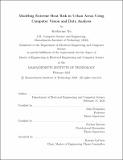Modeling Extreme Heat Risk in Urban Areas Using Computer Vision and Data Analysis
Author(s)
Xu, Katherine
DownloadThesis PDF (27.63Mb)
Advisor
Fernández, John
Bayomi, Norhan
Terms of use
Metadata
Show full item recordAbstract
Climate change is one of the greatest threats facing humanity, impacting the social and environmental determinants of human health. Urban areas suffer the effects of urban heat islands, which exacerbate the temperature rise from extreme heat events because they have more paved surfaces, less vegetation, and more heat created from human activities. As a result, heat risk modeling aims to reduce heat risk for vulnerable communities by assisting urban planners and policymakers in efficiently and effectively identifying regions within cities that may need more heat adaptation amenities. However, current heat risk modeling approaches are limited because they may not completely utilize available data sources or be easily generalizable to multiple cities. To overcome these limitations, we create a weighted sum model that estimates the extreme heat risk of an urban area at the granular census tract level. To construct this model, we leverage semantic segmentation techniques to extract relevant risk factors from aerial scene images, and we incorporate additional heat hazard and heat vulnerability factors from publicly available land surface temperature, building, and socioeconomic datasets. As a proof of concept, this research focuses on developing a heat risk model for Boston, which experiences intense urban heat islands.
Date issued
2023-02Department
Massachusetts Institute of Technology. Department of Electrical Engineering and Computer SciencePublisher
Massachusetts Institute of Technology